I love Brazil for many reasons. Many, many reasons. I love Brazil because of her people, her language, her music, her Carnaval, her architecture and design, her royalty, her roskas and her fun lovingness. I’m not so wild about the the water, the sewer system or the heat. But hell, that ain’t nothing when you compare it to all the positives. And you can get around a couple of the negatives pretty easily.
The United States is a melting pot, of course. Brazil is, too, but their mix seems to blend better than ours does here. A Brazilian can run the gamut in color from Gwyneth Paltrow to Seal with an incredible array in between. They are really good looking people due to the melange of characteristics, from the Argentinian influence to the African. The heavy Japanese presence due to the 1908 immigration is also a big part of it. When I was writing about the MTV-Brazil show, Covernation, I mentioned the fact that the audience consisted of a large number of Japanese. I thought it was kind of odd. I now know why they were there. They were just Brazilians.
Brazil has a very low quotient of assholes. VERY low. Unless we were just shielded from it by Carol or Marcelo. But I don’t think so. Even when we were on our own, 99% of the people were great–friendly and completely down with our Americanness, it seemed to me. The attempt to talk to them may have helped by putting the old “hapless tourist with his Berlitz book” spin on things. I don’t know. But they were, by and large, an incredibly laid-back bunch. And sweet, too. The universal thumb was given freely.
“Why, Ben? Why?” you’re asking.
I said it before, and I’ll say it again: the music has a huge impact on the Brazilian. Some of the most popular music themes are Carnaval, nature, love, dancing, partying and love. “Meu amor” (my love) is a phrase heard repeatedly in Brazilian music. They don’t get a whole lot of angsty music. Not as much as we do here. I may be talking out of school, but I didn’t hear a lot of whiny stuff or pure angry rap. What I heard that would qualify was mixed in with Axé and other styles. Of course I have no idea what they might have been saying. Probably “Kill the fat sweaty tourist!”
Brazilians seem to be at ease with their stations in life. They appear to have fallen into their own niches and like being there. Regardless of the jobs they were doing, people were universally friendly and happy to serve. The rumor that Brazilians are lazy is completely false. From Amparo the manicurist, through Carmen and Suely, Carol’s house staff, to Luciana the masseuse, to the gate guys, each performed his job with good humor laced with love and a healthy amount of respect–which was returned by the family in equal amounts. Interactions between employers and domestic help in the United States is far different.
Even cops and their ilk were pleasant. The police maintaining order at Carnaval in Salvador never gave off the vibe of being unreasonable. They looked plenty enough badass, but not to people who didn’t deserve it. Same with the security guards at Bahia Flats. Smiling, pleasant, but totally on top of things.
In addition to that, I was stunned at the way people obeyed the maximum occupancy sign in the elevators there, never overloading. Their sense of self monitoring was incredible. Our being the only car inching its way through a throng packing the street would be a disaster in the US. In Salvador, it was like a corpuscle making its way leisurely through a vein. We did this two nights in a row to the same delightful result.
And where was the spewing vomit on the Carnaval route? THERE WAS NONE THAT I SAW! These people really knew how to keep a lid on it. Simply amazing.
Brazilians are obviously comfortable in their own skins. For now. It is partly due to the much smaller stream of modern cultural trash they have received most of their lives, many having no contact with it at all because of money. But this is rapidly changing with their hungry acceptance of modern technology and its ready availability.
Their lives revolve more around fresh food, no waste, reuse and recycling, and the primitive tenets of a smart society that also espouses good stewardship of the earth. But they are being seduced on a daily basis away from this mindset. Witness the satellite dish and voracious soap opera viewers in a tiny Amazonian village. Witness the alarming rape of the rainforest in the name of “having more.” They are not only more aware of the outside world, but see what they haven’t got, and now MUST HAVE. Uh oh.
I can’t speak to the crime, because we didn’t experience any. I know that all of the Cerqueiras except Patricia have been robbed in one form or another. Their house was broken into once, which prompted grilled windows and a neighborhood gate man. They carry on unfazed, however, and treat it as a part of the deal. Hence the little V spikes on all the walls and rooflines in Rio. I saw a few in Salvador as well, but not as many.
I believe Carol told me that Carmen and her family live in a favela, and that they all watch out for each other there, despite the drugs. She didn’t mention that at the time, I don’t think. I’ll get clarification from her on this matter. So does that mean all the favelas aren’t controlled by gangs? Or are some gangs kinda nice to their favela? How does that work? I know that City of God is the “definitive” favela movie, but does that define all favelas? I must know more! Carol?

Benje Baby,
What a tall task you’ve thrown at me: briefly explaining the intricacies of favela development and social structure!
To provide a little background, favelas date back to the 1950s when Brazil experienced a large swell of rural to urban migration tied to accelerated industrial growth and development. When penniless migrants arrived in the cities, civil construction and public works absorbed this mass of male unskilled labor, while women usually worked as domestic servants, cooks, nannies, washerwomen, etc. The wages of these jobs barely covered food and clothing, leaving nothing for shelter.
The industrious and resourceful new arrivals began to clear the woods and brush of overlooked and undesirable (steep ravines, remote, subject to flooding) plots of land and fashion their own mud-hut-thatched-roofed dwellings. From these rudimentary abodes sprang favelas, constantly evolving in an upward spiral, as precarious materials are replaced with blocks, cement and tile roofs; floors are added, additions are tacked on, etc. This is the very inverse of the process of decay and dilapidation that characterize our US urban slums, and one key difference is land tenure. Though favela dwellers don’t “own” their homes in an official sense, for practical purposes, they are proud homeowners.
In Salvador, roughly 60% of the population lives in favelas, or self-built communities, if you will. Hence, not only Carmen lives in a favela, but Suely, Orlanildo, Rosangela and Amparo do as well. There is an intricate kinship network in these communities as word of mouth plays a role in migration and settling, and usually once a family member has established himself in the city, others follow in flocks. In Carmen’s case, she is surrounded by the rotten, no-good, louse of a husband’s family. Amparo and her ex-husband built on the back of his mother’s lot. Rosangela built on top of her mother’s house, with several siblings in the vicinity, Orlanildo is surrounded by his wife’s kin, etc.
As to drugs and gang control of favelas, I can offer what I know of Salvador. Rio seems to be a case unto itself. I confess I have not seen Cidade de Deus, as there is enough reality in my life that I seek movies to escape. Thus, I don’t know exactly what it portrays. I do know that drugs and gangs are a serious problem in Rio, due to the funneling of Colombian drugs, both for domestic consumption and export. Some (mainly conservative residents and former residents of Rio) lay the blame with deceased Governor Leonel Brizola and his tacit agreement to leave the morros (favelas in the hills) to the drug lords.
We were somewhat unaware of the extent of the presence of drugs and gangs in Salvador’s favelas until this past June, when an incarcerated drug lord was discovered to have cash under his mattress (see story below, which fails to mention the refrigerator was stocked with beer and champagne). His immediate transfer to a maximum security prison in Paraná unleashed a turf war which made the term chacina (mass slaying) roll off of our tongues with alarming frequency.
Despite these serious negatives to life in the favelas, given that over 1.5 million people in Salvador reside in such areas, there is neither drug trade nor gang control to account for that number of people or physical area. Most favelas are inhabited by the very simple, honest and hardworking people you saw everywhere you looked here, (I’d guess that about 100% of cordeiros (sheep for the drug lords) live in favelas), but only the minority, and in areas rife with violence or controlled by drug traffickers.
So Cuz, I don’t know what information you’ll glean from this to add to your blog, but you’ll need to do something make it sound interesting, witty, or amusing. I agree with the others that the abrupt first ending didn’t do justice to the trip or the blog.
Beijos e abraços,
Cuzin Carol
Updated 8:09 p.m. ET June 3, 2008
SAO PAULO, Brazil – Officials in northeastern Brazil say they confiscated the equivalent of more than $170,000 and two pistols from an imprisoned drug trafficker whose jail cell was equipped with a plasma TV set, a refrigerator and gym equipment.
Jose Francisco Leite, head of the state of Bahia’s Prison Affairs Department, said the “posh prison life” Genilson Lins da Silva led came to an abrupt end on Monday when police raided his cell as part of a statewide crackdown on drug trafficking.
Leite said Tuesday authorities have ordered an investigation to find out how Silva got the money and guns into his cell.

I’m glad we were exempt from crime while we were there. I also feel that if a tourist kept his eyes open and stayed away from totally sketchy places, he would be fine in Salvador or Rio. But it would be a real bitch to get robbed and have no idea at all what the perpetrator was saying to you. Whatever it was, whether menacing or not, it would have the lovely sound of Portuguese.
Brazilians speak the most beautiful, lyrical language this side of Italian. And some aspects are even better, in my opinion. The preponderance of soft “g” sounds combined with the ubiquitous “ão” sound serve to make Portuguese unique, and sexily beautiful. They speak with animated mouth movements, and in a rapid-fire roller-coaster cadence.
Speaking Spanish won’t help much in speaking Portuguese, but reading Spanish can be a big help. The difference lies in the pronunciations. The word “verdad” in Spanish (truth) is spelled “verdade” in Portuguese, but the final “d” in the letter is sounded as a soft “g” (ver-DAH-jey). And what’s with the initial “R” in a word being pronounced as an “H”? As in “reais” (hay-eyes) or “rua” (hoo-ah) or “rio” (hee-oh). You could read “rio” but would have no idea what they were saying when it was spoken to you. Reading it is much easier than hearing it and understanding it, particularly because you have more time to digest the words when they’re written instead of spoken.
The whole time I was there, I mixed Spanish with my attempt at Portuguese, not really realizing that a Brazilian who spoke no Spanish would have no idea what “verdad” was, though both words are totally kissing cousins.
I was envious of Nelson for being able to speak seven languages. That would be, like, the ultimate. But Patricia was no slouch with her three, having learned Spanish in Chile through total immersion at college. She was a big help translating my bungled Spaniguese. I was also envious of Carol, and thought she spoke beautiful Portuguese. But obviously her accent is pure American, because the kids laugh at it all the time. The Cerqueira house rule has always been “English only.” But I found it interesting that Daniel and Patricia communicated in Portuguese when they were talking between themselves. I think it was actually Daniel initiating it more, being a lax young guy who wore it like his favorite jeans.
The times I really wanted to know Portuguese was when I was listening to the music.
I cut my teeth on Latin music in general, and Brazilian music in particular. My parents, being musicians, were smitten with the rhythms and passed the love on to me. I swear, you can take a really substandard song, put it to a samba beat, and instantly make chicken salad out of chicken shit! There must be something about the fact that the appeal is based on rhythm, but it’s not straight rhythm. It takes little timing detours and curves, just like the cobblestone streets of Salvador.
That’s the thing about Latin music that draws me in the most: the syncopation. Music in America really got interesting when we discovered it here. Before that, hillbilly and folk music that was indigenous to the US was rather rhythmically boring. The black influence was the Mrs. O’Leary’s cow that kicked the lantern and started the fire in American music. After that, it loosened up here.
In Brazil, their indigenous music is freer and more interesting at the get-go: more celebratory, more melodic, more hooks in the music, both tonal and rhythmic. The angsty Scots-Irish and other Europeans that settled here were much more uptight. Their themes of death, starvation and murder were real party-starters. Even the Italians were restrained.
If you gave three 19th century Americans and three 19th century Brazilians an acoustic guitar, a string bass and a conga drum, I’ll bet you dollars to doughnuts you’d rather throw down with the Brazilians.
I grew up on great stuff: Antonio Carlos Jobim, João Gilberto, and the smooth-as-a-caipirinha Sergio Mendes. Nothing was as sexy or compelling. I was exposed to Gilberto Gil, Jorge Ben, Caetano Veloso, Carlinhos Brown, Os Mutantes and other masters through David Byrne’s Brazilian compilations, which were all stellar.
I’ve lately begun to more understand the importance of Gilberto Gil and his pals. The Brazilian mindset at the time was more folk music driven, and the Tropicale movement was rather startling to the hoi polloi. This was the first time any of the artists in the country had asked any questions about why society was the way it was. They weren’t quite as militant as their counterparts in the U.S., but for Brazil, they were pretty radical. Despite the fact that the movement touched on serious subjects at times, the members still produced plenty of stuff that celebrated their love for their país tropical, with the centerpiece being the Carnaval anthem of the same name, written by Jorge Ben.
Ah, Carnaval! If there were ever any modern influence on Brazilian music, this is it. Carnaval anthems are everywhere in the Big Songbook of Brazil, and everybody knows every word to every song. And will sing along right in time with the live performers. Word for word, I’m tellin’ ya! It makes for a surreal, soccer-game-style sonic experience.
And they’re not singing American songs. American music is popular enough in Brazil, but it by no means even comes close to dominating the landscape. Brazilians love their stars, and the stars love them back. Or do a damn good job of faking it.
Their singers and players grew up doing just that: singing and playing for friends, in public, whatever. They’ve always had the music in their bloodlines. And in Brazil, it’s a very democratic experience, in that they take audience participation to a new level with their exhortations to the crowd for response. The entertainers are a threat to stop in the middle of a song to holler something at the crowd, while the band plays on and the audience takes the vocals. It’s a seamless deal. No dead spots anywhere.
The modern Brazilian sound is kind of a like a really sexed-up version of any Motown or Earth, Wind and Fire. The machine-gun horn sections playing crazy 16th notes together become a massive tent pole in their music. And the hooks are everywhere. Ivete Sangalo doing “Abalou” may as well be a Martha & the Vandellas song–made below the equator, where the water is supposed to drain backwards. Babado Novo, fronted by the delicious Claudia Leitte, is Mary Wells or the Marvelettes when they do “A Camisa E O Botão”.
The women in Brazil are big-voiced contraltos, probably from singing all their lives and yelling stuff at the crowd. It’ll give you a nice, rich patina in just a few years. It was a shock when I heard Voa Dois at first, because half the time I couldn’t tell when Katê ended and Fred began. Same thing happened when Ivete came down the street. I thought she was a high-singing guy at first. But every one of the stars in Brazil is a natural on stage, and works his ass off playing live.
Don’t think America hasn’t heard any of this incredible music. Oh, they have (“they” being the music industry suits), but they can’t reconcile the cost of bringing Ivete’s 30-piece band on tour. “Can’t you strip it down to a couple of synthesizers, honey?” they ask.
“Não!” she replies. “Eu não o preciso.” (“I don’t need you,” according to BabelFish. But when run back through it says “I don’t need it.” Close enough.)
And they DON’T need us in order to be hugely successful. They like it where they are, playing for their peeps and enjoying life. Don’t think they’re not making plenty of money. . .but enough may be enough for them, I don’t know. I think it’s rather refreshing that they have such a massive music scene that has no dependence on us at all. HA!
It’s impossible to separate Brazilian music from Carnaval, because it’s the beat that drives the festivities. Particularly in Salvador, where Carnaval IS music. And once again, it’s the one thing that unites all these people. There’s a line in a William Shatner song, “Common People,” that sums it up best: “dance and drink and screw, cause there’s nothing else to do.” Carnaval is the very best diversion from an ordinary life, often marred by poverty.
So in 1950 when the original trio took off down the streets of Salvador in the fobica (the 1929 Ford powered for music), the people that followed them, singing and dancing, were probably less than rich. And though the trios elétricos have evolved into giant moving stages, and people pay money to parade inside the blocos, everybody is still invited to the party, with a chance to see and hear Brazil’s biggest stars FREE, and parade in a pipoca if they want to. The people that say Carnaval is elitist are totally full of shit.
Rio, being a more cosmopolitan city, hosts an entirely different, but no less stunning, Carnaval. Here, the spectators pay (a pretty penny) for limited seating in the Sambódromo, with the whole spectacle taking place in three days. That’s only a very small percentage of the city, not counting the rest of the world, who get to experience the show. Rio’s Carnaval could be summed up as “Mardi Gras in Mobile and New Orleans combined, then on acid.”
This isn’t a bunch of drunk swells wearing satin costumes, riding colorful floats, all the while pelting the crowd dismissively with trinkets and snacks, the revelry colored by the disdain many of the riders hold for their audience. No, no. The paraders in Rio would kiss each individual ass in the stands and the judges’ box for applause and support. Anything to win the competition for best parade group. And though everybody in the city is rabid about his own favorite group, Rio’s Carnaval is skewed to people with enough money to participate, though all the groups are televised. There’s no way that television could do it justice. It blows the others away in matters of spectacle. Staging, costumes, choreography and music all come together in a production like nothing else on earth.
The Brazilian sense of art and design permeates the whole place. From the innovative modern architecture juxtaposed with colonial ornamentation to the public art that is everywhere, these folks are avid lovers of color and line. When I say “public art,” it may possibly be taken as graffiti in the US. But this stuff was everywhere, in Salvador, Rio and Manaus, and the images were often beautiful, complex, funny, even political. Surely it is espoused by the local governments, but I have yet to find out how. It serves as a pretty good bridge between the omnipresent graffiti and the “established” art and architecture.
Brazilian architects are not afraid to be creative. And their clients obviously aren’t, either. Both Salvador and Rio were experiencing a period of renovation and restoration that was satisfying on so many levels. Santa Teresa, once the gem of Rio, was being brought back to life by the bohemians just as so many sections of New York have in the past. And there is no way that four big cities in the US would allow an artist to design sidewalks for them, as is the case in Rio, Manaus and the other Brazilian cities that sport these different black and white designs. In Rio alone, there are several different patterns. It seems that the legal snags we have in the US are less obnoxious in Brazil. They seem to get away with more.
The Portuguese Royal Family was a huge contributor to the Brazilian landscape, Rio in particular. In three generations, King John and Dom Pedros I and II impacted the country in a way that helped usher them into the 19th century and carry them into the 21st. Where the European royal influence is centuries old, and features miles and miles of family branches, the Portuguese royals were nothing more than “a touch of class” to Brazil. But WHAT a touch! From the botanical gardens to the Christ statue, the major cultural projects in Brazil were spearheaded by the royals, who were obviously very benevolent, and loved their new home and its people dearly. Their impact was obviously felt to the core: Portuguese was adopted as the national language long ago, and is spoken by all the citizens with pride.
The one thing the Royals learned when they landed in Brazil was to let the locals make their food and drinks. They are not only capable, but resourceful, and will produce a gustatory delight that will either fill you up or lay you on the ground. The use of fresh Brazilian fruits in the roskas makes each one a distinct experience. The combinations are endless, and most of them are pretty lethal. That’s why we tempered our drinks with club soda for survival’s sake. But they were fun-starters without a doubt, and the locals appeared to stay on a pretty even keel even though their bellies were full of them. And beer.
Is that what makes them so fun-loving? Maybe part of it. But I didn’t detect a whole town of lushes walking around. Their vibe was relaxed without liquor. Maybe it’s the heat. I don’t know. But they seemed to be pretty okay with life, and found enjoyment in it. Why else would everything be closed for Carnaval in both Salvador and Rio? As Marcelo put it so succinctly, “They’d rather be having fun.”
It’s hard to fully enjoy all the fun, though, if you’re punched in the stomach by a reaction to the “sweet waters”. I learned several things: 1) take the acidophilus like Klopman told me to; 2) don’t drink the water, even to take a few pills; 3) watch the coffee, too, because even Brazilians who “only drink bottled water” make their coffee from tap water. There’s no coffeemaker hot enough in the world to boil the bad ju-ju out. That’s all. It’s pretty easy to do. I was just too stupid to pay any attention. I was too wound up by the substandard sewer system.
The predominant custom of not flushing toilet paper was a real eye-opener. I don’t care how nice the garbage can by the toilet was, or how tightly the lid fit on top, it was a real shocker. Fortunately, the Cerqueiras are flushers, as were the owners of Mirante de São Francisco in Rio. But everywhere else, NO. Not even in Rio’s luxurious Confeitaria Columbo. All I could think of was the poor person who had to empty the cans. Combined with the oppressive heat, it was a real comfy experience.
Being as only the bedrooms in Brazil are air conditioned, it makes for some hot times. They are very good with breezes and how to take advantage of them, and I’m sure that after a while you would get used to it. But being a sweaty hog from the get-go, I found myself shedding gallons of sweet water on a daily basis. But nobody seemed to care. Kind of like life’s other bummers: Brazilians take it all in their casual stride.
That’s a whole lot to like.

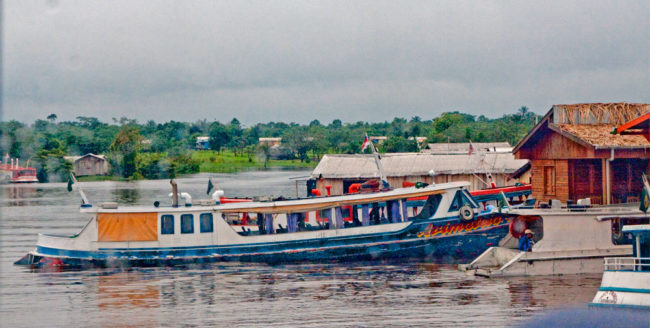




 Pretty cool, eh? I’d love to have it at my house. This shot of Robo talking to Cassio about God-knows-what should accurately reflect how he felt. The look he’s giving me (?) or not (?), it’s hard to tell, is one of Alec Baldwin being hounded by paparazzi.
Pretty cool, eh? I’d love to have it at my house. This shot of Robo talking to Cassio about God-knows-what should accurately reflect how he felt. The look he’s giving me (?) or not (?), it’s hard to tell, is one of Alec Baldwin being hounded by paparazzi.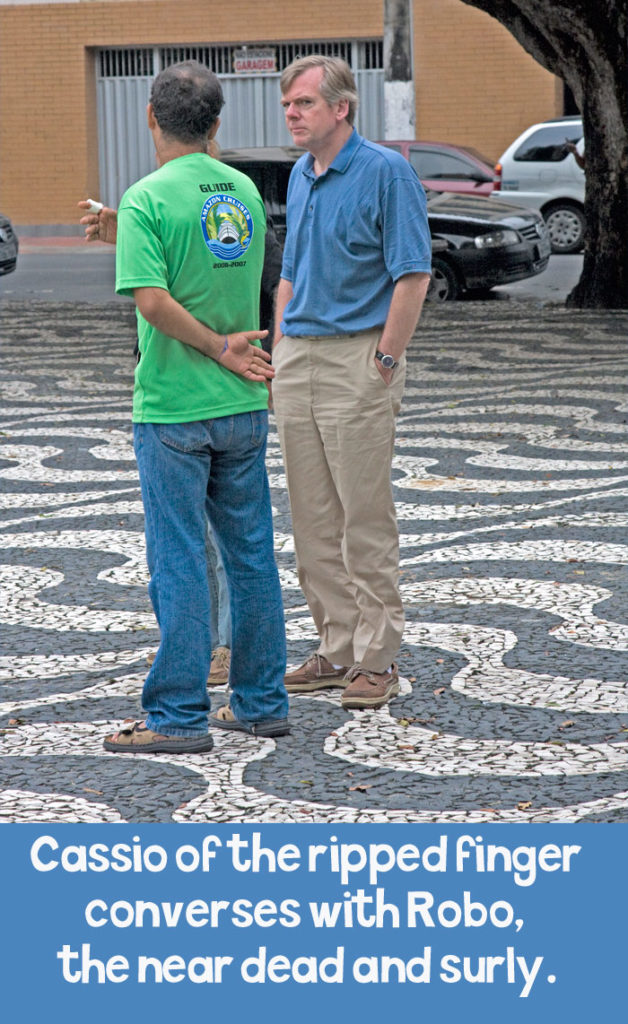 This church on the other side of the street was nice. See Pettus running for the van with Robo standing in front. No telling where MawMaw was. Probably inside, ready to go to the waters.
This church on the other side of the street was nice. See Pettus running for the van with Robo standing in front. No telling where MawMaw was. Probably inside, ready to go to the waters. We had to really book it to make the waters. As for the intermitttent rain, Cassio informed us that the guy wouldn’t take us out there in it. Getting there fast was even more important. So of course our driver crept to the boat landing, while I thought I was gonna vibrate my left leg off. Robo said he was gonna stay in the car at first, but after we had all left and it was just him and the driver, he suddenly popped out of the van and indicated that he had changed his mind.
We had to really book it to make the waters. As for the intermitttent rain, Cassio informed us that the guy wouldn’t take us out there in it. Getting there fast was even more important. So of course our driver crept to the boat landing, while I thought I was gonna vibrate my left leg off. Robo said he was gonna stay in the car at first, but after we had all left and it was just him and the driver, he suddenly popped out of the van and indicated that he had changed his mind. Cassio led us down the ramp to our boat. These beautiful shots lay in between.
Cassio led us down the ramp to our boat. These beautiful shots lay in between.

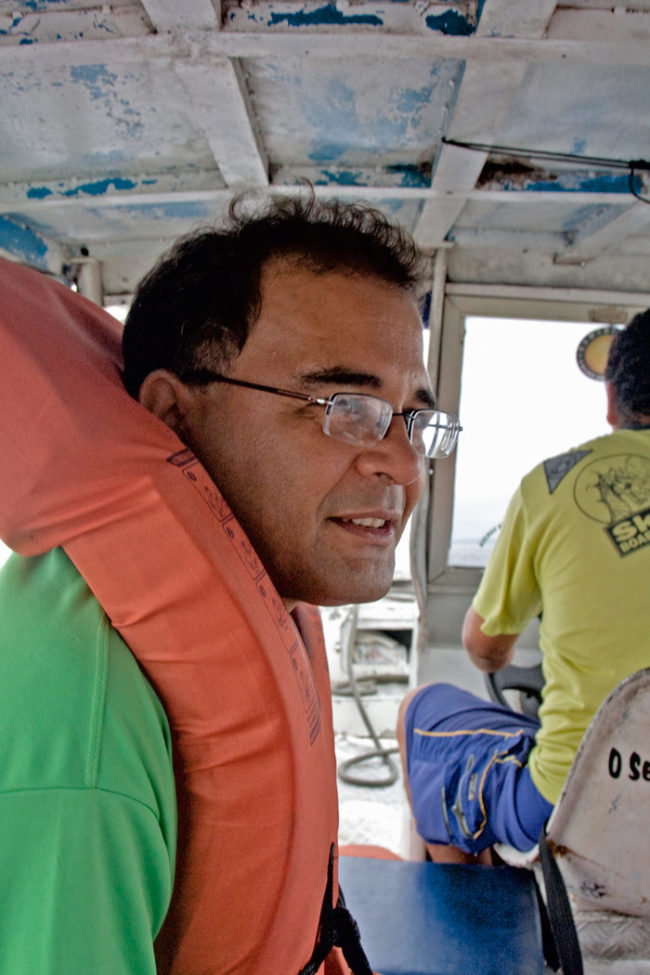 The Captain was probably a member of that fundamentalist sect that Carol had told me about, judging by the phrase on the back of his chair. It reminded me of the old “God is my co-pilot” days. I believe it translates to “God is with me.”
The Captain was probably a member of that fundamentalist sect that Carol had told me about, judging by the phrase on the back of his chair. It reminded me of the old “God is my co-pilot” days. I believe it translates to “God is with me.”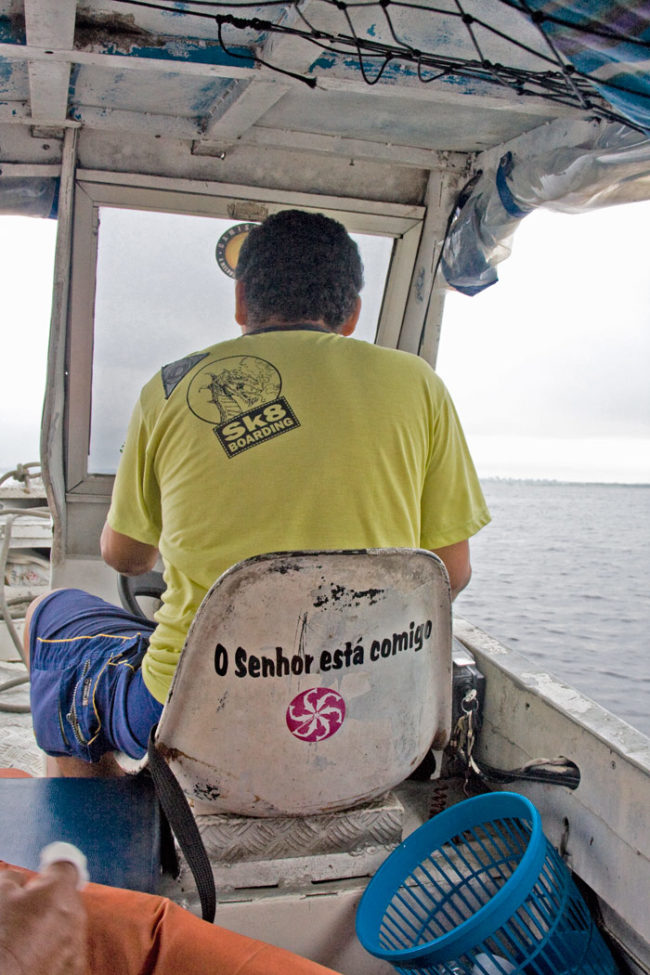 The meeting was upon us! It was the craziest thing ever. The Captain sailed around and around letting us feel both waters, one being even more chilly than ususal: about 15 degrees cooler than the Negro. The visual difference was incredible. I could see how it would be very neat to see it from a small plane, and follow the two waters down until they merged.
The meeting was upon us! It was the craziest thing ever. The Captain sailed around and around letting us feel both waters, one being even more chilly than ususal: about 15 degrees cooler than the Negro. The visual difference was incredible. I could see how it would be very neat to see it from a small plane, and follow the two waters down until they merged.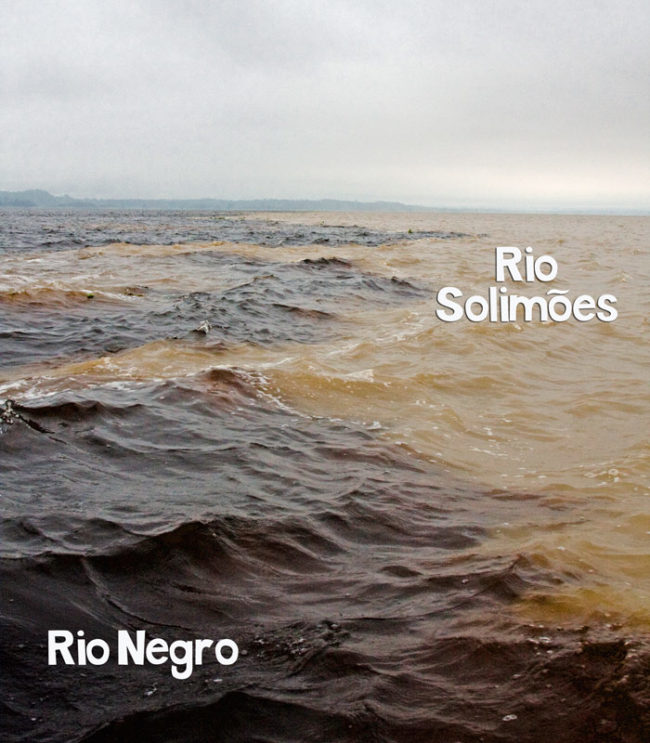
 Pettus’ reaction was pretty much standard for the rest of us. Even Robo perked up for this natural oddity of a lifetime.
Pettus’ reaction was pretty much standard for the rest of us. Even Robo perked up for this natural oddity of a lifetime. Okay, we had seen it, it was fantastic, and it was time to go. That’s the problem with things like the meeting of the waters: how long do you stay after you’ve seen it and touched it and know what it does? I guess we could have followed it for a while, but it would have been useless unless we followed it to the real merge in the Amazon River. It was unforgettable nevertheless.
Okay, we had seen it, it was fantastic, and it was time to go. That’s the problem with things like the meeting of the waters: how long do you stay after you’ve seen it and touched it and know what it does? I guess we could have followed it for a while, but it would have been useless unless we followed it to the real merge in the Amazon River. It was unforgettable nevertheless. The lifering was really nice and offered an interesting picture. The primary colors are unbelievably irresistible to me. I think they hit people on a subconscious level, being as all the colors come from these three. Everything in threes. One of the fantastic mysteries of life.
The lifering was really nice and offered an interesting picture. The primary colors are unbelievably irresistible to me. I think they hit people on a subconscious level, being as all the colors come from these three. Everything in threes. One of the fantastic mysteries of life. We pulled into the dock, which was jammed with boats, none in slips of any kind, and upon debarking, encountered this charming little girl and her father. I asked if she would mind me taking a picture, and Dad said no.
We pulled into the dock, which was jammed with boats, none in slips of any kind, and upon debarking, encountered this charming little girl and her father. I asked if she would mind me taking a picture, and Dad said no. I like his gaucho-style hat, and look a those incredibly straight, white teeth. Where did they come from? Heredity?
I like his gaucho-style hat, and look a those incredibly straight, white teeth. Where did they come from? Heredity?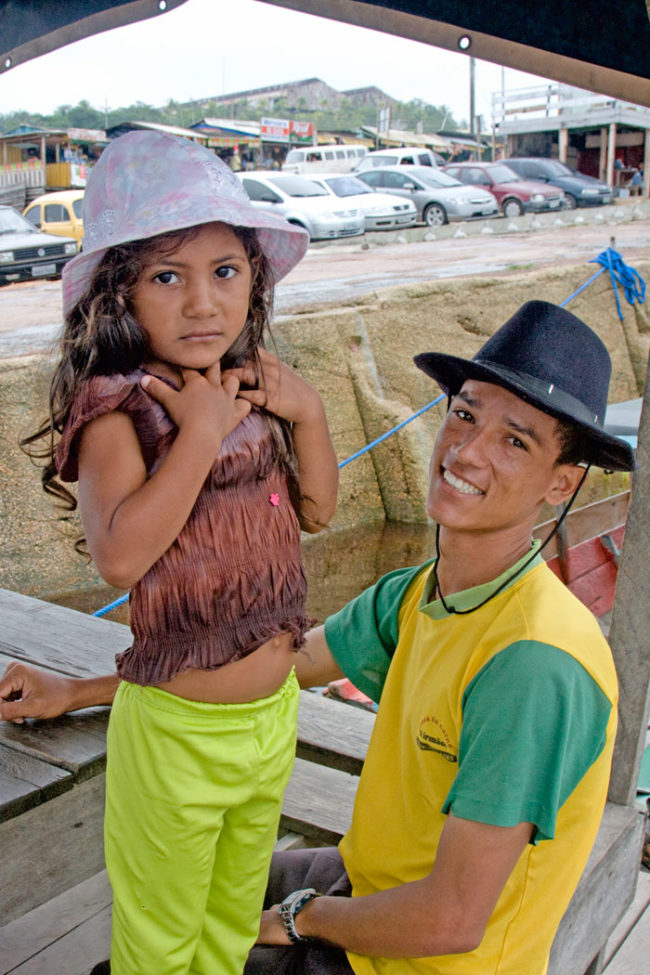 We said goodbye to the captain, obrigadoe’d the shit out of everybody and headed up the landing to the bus. The little cafés were an interesting picture–the last one I took on the trip. After this, the camera went into the bag and stayed there until it woke up in Birmingham.
We said goodbye to the captain, obrigadoe’d the shit out of everybody and headed up the landing to the bus. The little cafés were an interesting picture–the last one I took on the trip. After this, the camera went into the bag and stayed there until it woke up in Birmingham.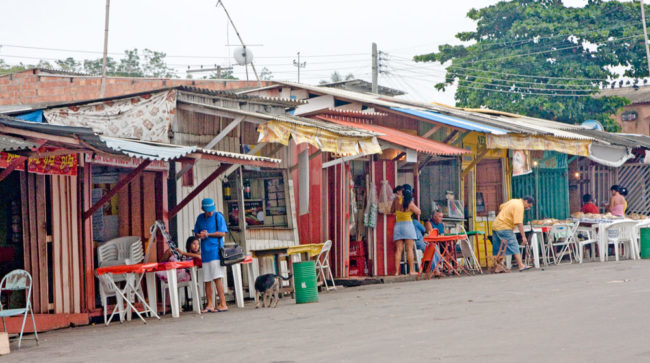 We had to hit the road fast in order to get to the airport in time to check in for our TAM flight. The amazing thing is, the minute we were all loaded in the van, the bottom fell out, and it rained like it hadn’t all week. Great for us to have been able to see the meeting, but bad because it was a proven fact that our driver hated going fast in the rain.
We had to hit the road fast in order to get to the airport in time to check in for our TAM flight. The amazing thing is, the minute we were all loaded in the van, the bottom fell out, and it rained like it hadn’t all week. Great for us to have been able to see the meeting, but bad because it was a proven fact that our driver hated going fast in the rain.

 Well! What a great way to be diverted before we were herded onto the big silver bird sure to fly sluggishly toward Miami. I honestly couldn’t tell you one thing about the flight. Surely it’s kind of like what happened to
Well! What a great way to be diverted before we were herded onto the big silver bird sure to fly sluggishly toward Miami. I honestly couldn’t tell you one thing about the flight. Surely it’s kind of like what happened to 